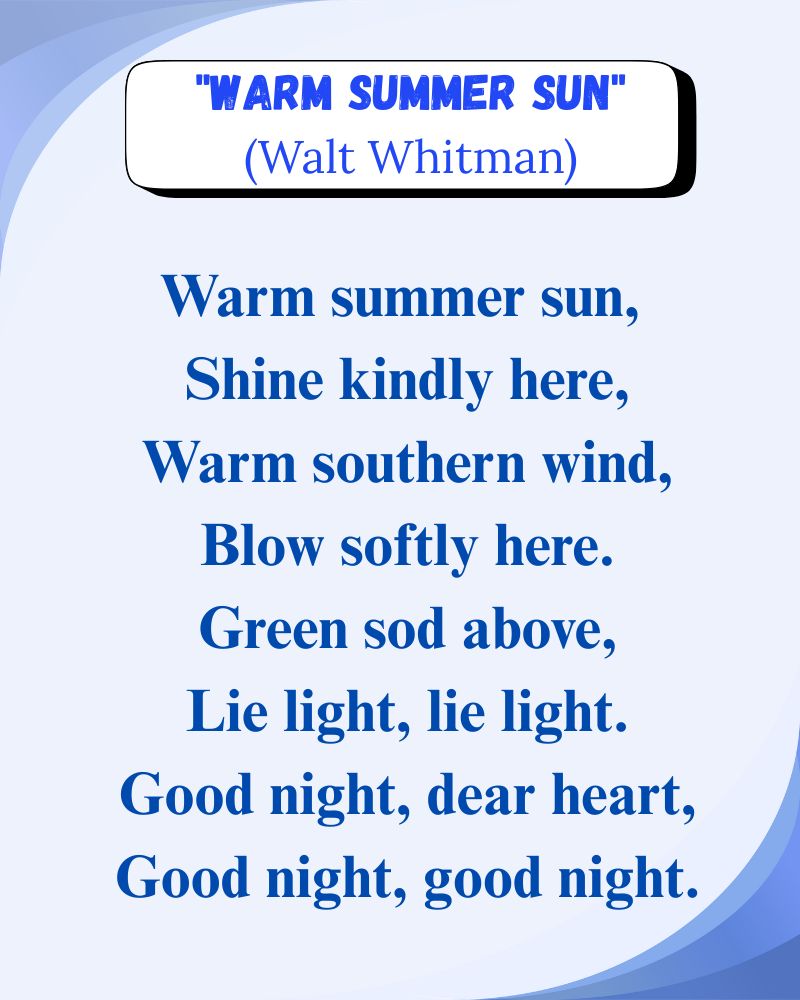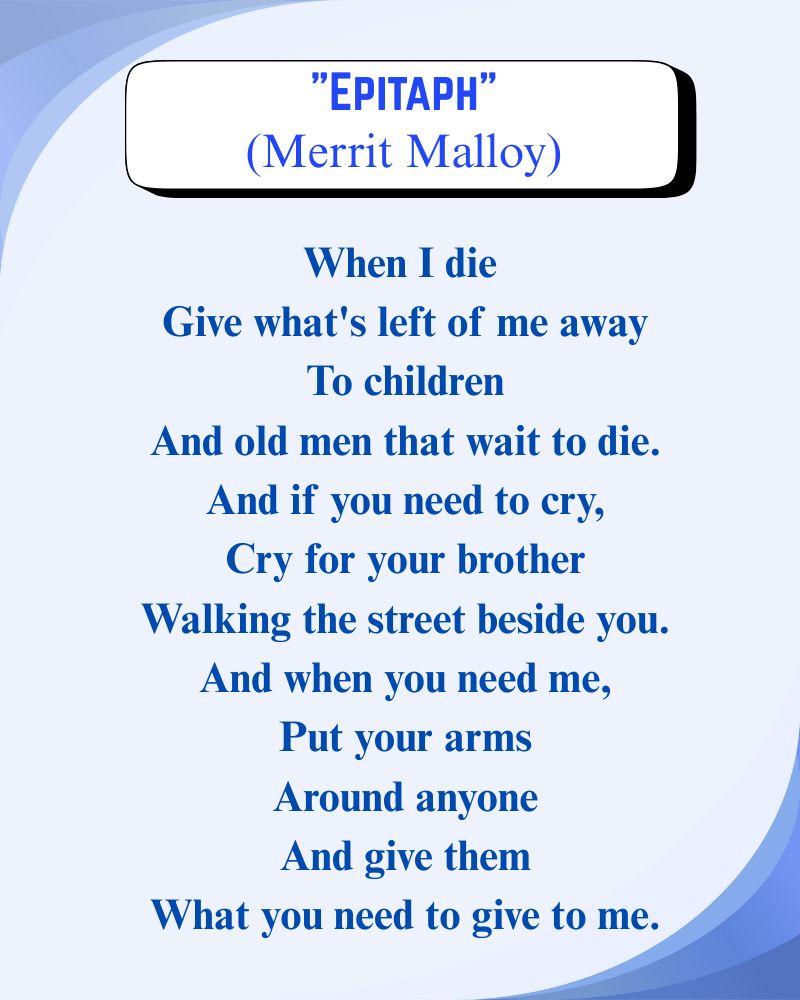When words escape us during profound grief, poetry becomes our voice. These carefully selected verses transform memorial services into meaningful tributes that celebrate lives well-lived.
Whether planning an intimate gathering or large celebration of life, the right poem creates lasting comfort for everyone present.
Powerful Short Poems for Celebration of Life Services

Related Poem: 10 Mother’s Love Poems After Death
1
“Warm Summer Sun” by Walt Whitman
Warm summer sun,
Shine kindly here,
Warm southern wind,
Blow softly here.
Green sod above,
Lie light, lie light.
Good night, dear heart,
Good night, good night.
Why this works: Whitman’s gentle imagery creates peaceful comfort without overwhelming emotion. The repetitive structure feels like a lullaby, perfect for celebration of life ceremonies seeking tranquil closure.
Best for: Nature lovers, summer services, or anyone who found peace outdoors. This poem’s simplicity makes it ideal for children’s participation or emotionally difficult moments.
2
“She Is Gone (He Is Gone)” by David Harkins
You can shed tears that she is gone
Or you can smile because she has lived
You can close your eyes and pray that she will come back
Or you can open your eyes and see all that she has left
Your heart can be empty because you can’t see her
Or you can be full of the love that you shared
Why this works: This thoughtful memorial poem reframes grief as celebration, encouraging positive remembrance over sorrowful dwelling. Its balanced structure presents choices between despair and hope.
Best for: Uplifting memorial services, celebration of life events, or families wanting to emphasize joy over sadness. Particularly powerful for those who lived fully and happily.
3
“Do Not Stand at My Grave and Weep” by Mary Elizabeth Frye
Do not stand at my grave and weep
I am not there. I do not sleep.
I am a thousand winds that blow.
I am the diamond glints on snow.
I am the sunlight on ripened grain.
I am the gentle autumn rain.
When you awaken in the morning’s hush
I am the swift uplifting rush
Of quiet birds in circled flight.
I am the soft stars that shine at night.
Do not stand at my grave and cry;
I am not there. I did not die.
Why this works: Arguably the world’s most beloved memorial poem, Frye’s verses offer profound comfort by suggesting continued presence in nature’s beauty. The imagery spans all seasons, providing year-round connection.
Best for: Anyone seeking universal comfort. This poem transcends religious boundaries while offering spiritual solace. Perfect for outdoor services or nature enthusiasts.
4
“Remember Me” by Margaret Mead
To the living, I am gone
To the sorrowful, I will never return
To the angry, I was cheated
But to the happy, I am at peace
And to the faithful, I have never left
I cannot speak, but I can listen
I cannot be seen, but I can be heard
So as you stand upon a shore gazing at a beautiful sea
As you look upon a flower and admire its simplicity
Remember me
Why this works: Mead’s anthropological perspective creates multiple viewpoints on death, allowing different mourners to find their truth. The poem validates various grief responses while offering continuing connection.
Best for: Celebration of life ceremonies with diverse attendees. Ideal for intellectuals, educators, or anyone who appreciated multiple perspectives on life’s complexities.
5
“If I Should Go Tomorrow” by Unknown
If I should go tomorrow
It would never be goodbye,
For I have left my heart with you,
So don’t you ever cry.
The love that’s deep within me,
Shall reach you from the stars,
You’ll feel it from the heavens,
And it will heal the scars.
Why this works: This thoughtful poem for memorial services addresses sudden loss with messages of enduring love. The cosmic imagery suggests continued watching and caring from beyond.
Best for: Unexpected deaths, younger people, or anyone whose passing felt premature. The healing message particularly comforts those struggling with guilt or unfinished business.
6
“Love Lives On” by Unknown
Those we love remain with us
for love itself lives on,
and cherished memories never fade
because a loved one’s gone.
Those we love can never
be more than a thought apart,
far as long as there is memory,
they’ll live on in the heart.
Why this works: Simple yet profound, this poem emphasizes memory’s power to preserve love. The rhyme scheme creates memorable verses that attendees can easily recall later.
Best for: Religious or spiritual services, family gatherings, or anyone who valued deep relationships. Perfect for creating keepsake cards or memorial booklets.
7
“The Dash” by Linda Ellis (Key Excerpt)
For that dash represents all the time
That they spent alive on earth.
And now only those who loved them
Know what that little line is worth
For it matters not, how much we own,
The cars… the house… the cash.
What matters is how we live and love
And how we spend our dash.
Why this works: Ellis’s famous poem refocuses attention from death to life lived. The dash metaphor resonates universally, making abstract concepts tangible and memorable.
Best for: Eulogies, celebration of life events, or anyone who lived with purpose and meaning. Particularly powerful for those who prioritized relationships over material success.
8
“In the Garden of Memory” by Albert Kennedy Smith
I built a garden in my heart
For all the things I love
I planted roses for the times
We shared our hearts thereof
I planted lilies for the peace
You brought into my life
And violets for the faithful way
You helped me through the strife
Why this works: The garden metaphor creates beautiful imagery while suggesting active memory cultivation. This memorial poem encourages ongoing remembrance through symbolic growth.
Best for: Gardening enthusiasts, spring services, or anyone who nurtured others throughout life. Perfect for creating actual memorial gardens or plantings.
Heartfelt Mid-Length Poems for Memorial Tributes

9
“Death Is Nothing At All” by Henry Scott Holland
Death is nothing at all.
It does not count.
I have only slipped away into the next room.
Nothing has happened.
Everything remains exactly as it was.
I am I, and you are you,
and the old life that we lived so fondly together is untouched, unchanged.
Whatever we were to each other, that we are still.
Call me by the old familiar name.
Speak of me in the easy way which you always used.
Put no difference into your tone.
Wear no forced air of solemnity or sorrow.
Laugh as we always laughed at the little jokes that we enjoyed together.
Play, smile, think of me, pray for me.
Let my name be ever the household word that it always was.
Let it be spoken without an effort, without the ghost of a shadow upon it.
Life means all that it ever meant.
It is the same as it ever was.
Why this works: Holland’s theological perspective presents death as transition rather than termination. The conversational tone creates intimacy while the “next room” metaphor offers accessible comfort.
Best for: Religious services, traditional memorials, or families seeking continuity over finality. Particularly comforting for sudden losses or those struggling with separation anxiety.
10
“The Life That I Have” by Leo Marks
The life that I have
Is all that I have
And the life that I have
Is yours
The love that I have
Of the life that I have
Is yours and yours and yours.
A sleep I shall have
A rest I shall have
Yet death will be but a pause
For the peace of my years
In the long green grass
Will be yours and yours and yours.
Why this works: The repetitive structure creates hypnotic beauty while the gift imagery transforms death into final offering. This thoughtful memorial poem emphasizes shared life over individual loss.
Best for: Military services, historical significance, or anyone who served others. Perfect for couples who shared deep partnerships or individuals who gave generously.
11
“Crossing the Bar” by Alfred, Lord Tennyson
Sunset and evening star,
And one clear call for me!
And may there be no moaning of the bar,
When I put out to sea,
But such a tide as moving seems asleep,
Too full for sound and foam,
When that which drew from out the boundless deep
Turns again home.
Twilight and evening bell,
And after that the dark!
And may there be no sadness of farewell,
When I embark;
For tho’ from out our bourne of Time and Place
The flood may bear me far,
I hope to see my Pilot face to face
When I have crost the bar.
Why this works: The nautical metaphor creates peaceful journey imagery rather than abrupt ending. The poem’s musical quality and hopeful conclusion provide comfort without denying loss.
Best for: Naval veterans, seafaring families, or anyone who loved the ocean. Particularly moving for coastal services or those who found peace near water.
12
“When I Come to the End of My Journey” by Lyman Hancock
When I come to the end of my journey
And I travel my last weary mile
Just forget if you can, that I ever frowned
And remember only the smile
Forget unkind words I have spoken
Remember some good I have done
Forget that I ever had heartache
And remember I’ve had loads of fun
Forget that I’ve stumbled and blundered
And sometimes fell by the way
Remember I have fought some hard battles
And won, ere the close of the day
Why this works: Hancock’s verses request selective memory, focusing on positive legacy over human flaws. The journey metaphor frames life as adventure rather than struggle.
Best for: Those who lived with optimism despite challenges, individuals who overcame difficulties, or families wanting to emphasize resilience over hardship.
13.
“Turn Again to Life” by Mary Lee Hall
If I should die and leave you here awhile,
Be not like others sore undone, who keep
Long vigils by the silent dust, and weep
For my sake, turn again to life and smile,
Nerving thy heart and trembling hand to do
Something to comfort weaker hearts than thine.
Complete those dear unfinished tasks of mine
And I, perchance, may therein comfort you.
Why this works: Hall’s poem actively encourages survivors to continue living meaningfully. The directive tone provides clear guidance for those paralyzed by grief.
Best for: Supporting grieving families, those who devoted their lives to helping others, or anyone who would want their loved ones to continue thriving.
14
“Epitaph” by Merrit Malloy
When I die
Give what’s left of me away
To children
And old men that wait to die.
And if you need to cry,
Cry for your brother
Walking the street beside you.
And when you need me,
Put your arms
Around anyone
And give them
What you need to give to me.
Why this works: Malloy’s verses transform grief into action, suggesting that love multiplies when shared. The poem’s directness creates powerful emotional impact.
Best for: Charitable souls, community leaders, or anyone who prioritized giving over receiving. Perfect for encouraging continued service in their memory.
15
“Miss Me But Let Me Go” by Christina Rossetti
When I come to the end of the road
And the sun has set for me
I want no rites in a gloom filled room
Why cry for a soul set free?
Miss me a little, but not for long
And not with your head bowed low
Remember the love that once we shared
Miss me, but let me go.
Why this works: Rossetti’s poem gives explicit permission for healing and moving forward. The conversational tone creates intimate connection while the message prevents prolonged grief.
Best for: Long illnesses, expected deaths, or anyone who worried about burdening others with their loss. Particularly comforting for those feeling guilty about eventual happiness.
Deep, Meaningful Long Poems for Celebration of Life
16
“Thanatopsis” by William Cullen Bryant (Selected Verses)
So live, that when thy summons comes to join
The innumerable caravan, which moves
To that mysterious realm, where each shall take
His chamber in the silent halls of death,
Thou go not, like the quarry-slave at night,
Scourged to his dungeon, but, sustained and soothed
By an unfaltering trust, approach thy grave
Like one who wraps the drapery of his couch
About him, and lies down to pleasant dreams.
Why this works: The caravan metaphor suggests shared human journey while the final imagery transforms death into peaceful rest. This thoughtful poem for memorial services validates both fear and acceptance.
Best for: Intellectuals, philosophy lovers, or anyone who approached life thoughtfully. Perfect for those who found comfort in understanding life’s larger patterns.
17
“When Lilacs Last in the Dooryard Bloom’d” by Walt Whitman (Key Excerpts)
When lilacs last in the dooryard bloom’d,
And the great star early droop’d in the western sky in the night,
I mourn’d, and yet shall mourn with ever-returning spring.
Ever-returning spring, trinity sure to me you bring,
Lilac blooming perennial and drooping star in the west,
And thought of him I love.
Why this works: The spring imagery suggests renewal despite loss while the star metaphor elevates the deceased to cosmic significance. This celebration of life poem balances sorrow with hope.
Best for: American history enthusiasts, spring services, or anyone who made significant public contributions. Particularly moving for leaders or those who served their communities.
18
“In Memoriam A.H.H.” by Alfred, Lord Tennyson (Selected Stanzas)
Strong Son of God, immortal Love,
Whom we, that have not seen thy face,
By faith, and faith alone, embrace,
Believing where we cannot prove;
‘Tis better to have loved and lost
Than never to have loved at all.
Why this works: The famous “better to have loved” line provides lasting comfort while the spiritual questioning validates doubt alongside faith. This memorial poem honors both human love and divine mystery.
Best for: Close friendships, literary families, or anyone who appreciated deep intellectual and emotional connections. Perfect for those who struggled with faith questions.
19
“Funeral Blues” by W.H. Auden
Stop all the clocks, cut off the telephone,
Prevent the dog from barking with a juicy bone,
Silence the pianos and with muffled drum
Bring out the coffin, let the mourners come.
Let aeroplanes circle moaning overhead
Scribbling on the sky the message He Is Dead,
Put crêpe bows round the white necks of the public doves,
Let the traffic policemen wear black cotton gloves.
He was my North, my South, my East and West,
My working week and my Sunday rest,
My noon, my midnight, my talk, my song;
I thought that love would last forever: I was wrong.
Why this works: The hyperbolic imagery captures grief’s overwhelming nature while the compass metaphor expresses total dependence. This thoughtful memorial poem validates intense mourning.
Best for: Partners, spouses, or deep love relationships. Particularly powerful for same-sex couples or anyone whose love faced societal challenges.
20
“When Great Trees Fall” by Maya Angelou
When great trees fall,
rocks on distant hills shudder,
lions hunker down
in tall grasses,
and even elephants
lumber after safety.
When great trees fall
in forests,
small things recoil into silence,
their senses
eroded beyond fear.
When great souls die,
the air around us becomes
light, rare, sterile.
We breathe, briefly.
Our eyes, briefly,
see with a hurtful clarity.
Why this works: The tree metaphor captures how important people affect entire ecosystems of relationships. The poem’s progression from disruption to healing provides complete grief journey.
Best for: Influential people, community leaders, or anyone whose death creates widespread impact. Perfect for those who nurtured and protected others throughout their lives.
Delivering Poems at Celebration of Life Services
Reading techniques for emotional moments help speakers navigate difficult passages successfully. Practice reading aloud beforehand, mark natural pause points, and prepare backup readers for overwhelming moments. Slow, deliberate pacing allows audience processing time while preventing rushed delivery.
Preparation strategies ensure smooth presentation during emotional ceremonies. Print poems in large, clear fonts with extra copies for backup readers. Consider laminated cards to prevent shaking hands from rustling papers. Mark difficult pronunciations and practice unfamiliar words repeatedly.
Technology considerations can enhance or complicate poem delivery. Microphones amplify voices but require comfort with equipment. Projection screens allow audience reading along but need technical setup. Simple approaches often work best during emotionally charged moments.
Backup plans prevent ceremony disruption if primary readers become overwhelmed. Designate secondary readers for each poem, prepare shortened versions for time constraints, and consider recorded readings as final backup options.
Visit for More heartful Content:

Admin of romanticflart.com, I share deep romantic lyrics and heart-touching lines. I love writing feelings in words. Let’s feel love together, every day.
